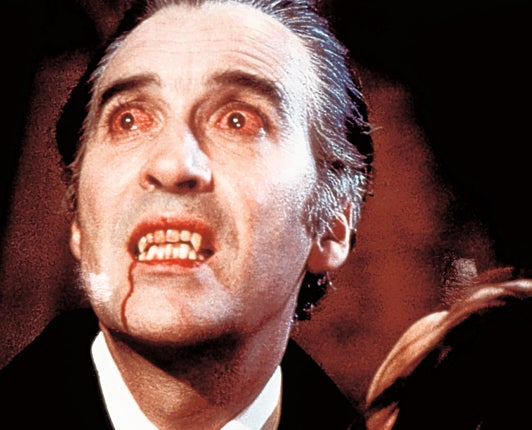Brian Viner: Why is film awash with honours?

Sir Christopher Lee, 88 years old and still 6ft 5ins in his slippers, is to be presented on Sunday with a Bafta Fellowship, the greatest honour the British film industry can bestow. This is splendid news, an overdue accolade for a man who, it is generally accepted, has appeared in more films than anyone alive, and rarely gets the recognition he deserves for being king of the franchises, the only common denominator between the Lord of the Rings trilogy, the Star Wars films, the Bond movies and of course the Hammer horrors.
Admittedly, the 007 connection relates only to The Man With The Golden Gun, in which he played the villain, Scaramanga, but in our house we feel a rather tenuous kinship with him because of it, for the late great-uncle of one of my daughter's best friends was George Scaramanga, a contemporary of Ian Fleming's at Eton. Fleming never forgot a good name. He was also at school with a boy called Blofeld (the father of the cricket commentator Henry), although however Scaramanga and Blofeld might have offended the young Fleming, they surely didn't deserve to inspire a triple-nippled assassin and a cat-cradling megalomaniac.
Anyway, back to Christopher Lee. I had the pleasure of interviewing him a couple of years ago, at the Marrakech Film Festival, which that year was honouring British film, and in the vast Palais des Congres I watched him and several other illustrious Brits – including John Hurt, Charles Dance and, a little incongruously, Nicholas Parsons – take the plaudits for the achievements of British cinema before a predominantly Arabic- and French-speaking audience.
Some of our stars ventured a few words of thanks, but only Lee did it in French, fluently and charmingly. Bafta couldn't be giving its prestigious Fellowship to a more urbane fellow.
As for his knighthood, that too came late in his long life, in the 2009 Queen's Birthday Honours, and that too seemed fitting enough, but on the whole I'm of the opinion that honours for actors should be left to their own industry.
Heaven knows, there are enough awards ceremonies for everyone deserving to fill their mantelpieces several times over, so why are knighthoods and damehoods also dished out like so much confetti? Harriet Walter, for example, is an estimable performer. I remember her being very good in an Inspector Morse years ago, and I'm told she's terrific on stage. But to make her a dame, as they did in the recent New Year Honours, seems more than a teensy bit over the top. Would a teacher or a doctor of equivalent stature in education or medicine be similarly honoured? Of course not.
Some years ago, I interviewed another fine old actor, Albert Finney. He told me that he had declined a knighthood more than once, believing that he owed it to his profession as well as his principles to remain plain Mr. That seems right, in a walk of life already strewn with red carpets. Keep the top honours for those who get little or no public recognition, but on Sunday by all means make a proper fuss of Sir Christopher Lee, whose niece, coincidentally, is Dame Harriet Walter.
We'd think twice if we called mortgages 'death-grips'
One of the pleasures of having three children at secondary school, among plenty of pitfalls, is that they teach you stuff.
Last week, I learnt from my 12-year-old son Jacob that the Latin word for eyebrow is supercilium, a marvellous titbit of knowledge that I never picked up in my own three years of learning Latin, years which seemed to be entirely bogged down in nominatives, accusatives and ablative bloody absolutes. Supercilium? I think that's wonderful, and the prosaic word eyebrow should make way for it immediately, so that we can say to our children, "don't you raise a supercilium at me!"
Whatever, we could all benefit from letting a bit more etymology, the study of the history of words, into our lives. I also learnt last week – from my older son, Joe – that the word mortgage derives from the French, meaning "death-grip". It's far too late, regrettably, but if our high-street banks and building societies were offering us favourable terms for death-grips rather than mortgages, ours might be a less debt-laden society than it has become. Who'd hurry to get themselves a death-grip?
Fifty years ago, we were closer to the word's French origins. My father-in-law, a no-nonsense Yorkshireman with an innate suspicion of debt, was by all accounts deeply reluctant to become a home-owner, putting himself in hock to the bank. That reluctance to become beholden, or death-gripped if you prefer, is one reason why, generally speaking, his generation is much less in debt than mine.
To this day my parents-in-law make their credit-card payments in full every month, but if they saw ours, well, supercilia would shoot skywards.
Why aren't we shocked by the price of art?
On Tuesday evening, a painting by Pablo Picasso was sold at Sotheby's for £22.5m. It wasn't an especially famous work, yet have you heard any howls of outrage? Or read any letters to newspapers asking how much medical equipment or famine aid £22.5m might buy? Had that money been spent on a relatively little-known footballer, by contrast, the righteous indignation would have been deafening, even though the footballer's artistry would at least be on public show, unlike most paintings that sell for that kind of money. Why is this? Is it that footballers are widely perceived as oiks, whereas expensive paintings are considered worthy of intellectual analysis? I don't know the answer, but it seems worth asking the question.
b.viner@independent.co.uk
Join our commenting forum
Join thought-provoking conversations, follow other Independent readers and see their replies
Comments
Bookmark popover
Removed from bookmarks